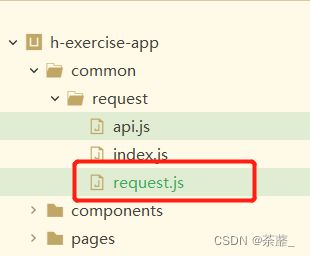uni-app 如何多环境配置env.js
新建uni-app后,根据网上的资料访问了后台,但是需要将开发环境、正式环境区分开来。
新建空模板之后,项目中是没有访问后台接口的配置的。本章简介多环境配置。
步骤
1 创建env.js
代码如下:
// .env.js 文件
// 不同环境访问不同的路径
// import store from '@/common/store/index'
// #ifdef H5
let protocol = window.location.protocol;
// #endif
const ENV_API_URL = {
development: 'http://19x.16x.0.x:端口号/', //开发环境
production: 'http://19x.16x.0.x:端口号/', //生产环境
}
const ENV_BASE_URL = {
development: 'http://19x.16x.0.x:端口号/', //开发环境
production: 'http://19x.16x.0.x:端口号/', //生产环境
}
export const BASE_URL = ENV_BASE_URL[process.env.NODE_ENV || 'development']; //后台根域名
export const API_URL = ENV_API_URL[process.env.NODE_ENV || 'development']; //后台接口域名
export const HAS_LIVE = false; //后台是否开通直播权限,根据情况在manifest.json中,开启注释相应组件的引入。
注意后台接口域名 API_URL,
2 创建request.js文件。(可以找下网上关于request的配置)
文件目录如下:
代码如下(API_URL是访问环境对应的ip+地址):
import {
API_URL
} from '@/env'
/**
* request.js是对基层网络请求的封装
*/
export default class Request {
config = {
baseUrl: API_URL,
header: {
'content-type': 'application/json'
},
loadingText: '请求中...',
loadingTime: 1000, // 在此时间内,请求还没回来的话,就显示加载中动画,单位ms
timer: null, // 定时器
timerState: false, //loading开启了没有
method: 'GET',
dataType: 'json',
// #ifndef MP-ALIPAY || APP-PLUS
responseType: 'text',
// #endif
custom: {},
// #ifdef MP-ALIPAY
timeout: 30000,
// #endif
// #ifdef APP-PLUS
sslVerify: true
// #endif
}
static posUrl(url) { /* 判断url是否为绝对路径 */
return /(http|https):\/\/([\w.]+\/?)\S*/.test(url)
}
static addQueryString(params) {
let paramsData = ''
Object.keys(params).forEach(function(key) {
paramsData += key + '=' + encodeURIComponent(params[key]) + '&'
})
return paramsData.substring(0, paramsData.length - 1)
}
/**
* @property {Function} request 请求拦截器
* @property {Function} response 响应拦截器
* @type {{request: Request.interceptor.request, response: Request.interceptor.response}}
*/
interceptor = {
/**
* @param {Request~requestCallback} cb - 请求之前拦截,接收一个函数(config, cancel)=> {return config}。第一个参数为全局config,第二个参数为函数,调用则取消本次请求。
*/
request: (cb) => {
if (cb) {
this.requestBeforeFun = cb
}
},
/**
* @param {Request~responseCallback} cb 响应拦截器,对响应数据做点什么
* @param {Request~responseErrCallback} ecb 响应拦截器,对响应错误做点什么
*/
response: (cb, ecb) => {
if (cb && ecb) {
this.requestComFun = cb
this.requestComFail = ecb
}
}
}
requestBeforeFun(config) {
return config
}
requestComFun(response) {
return response
}
requestComFail(response) {
return response
}
/**
* 自定义验证器,如果返回true 则进入响应拦截器的响应成功函数(resolve),否则进入响应拦截器的响应错误函数(reject)
* @param { Number } statusCode - 请求响应体statusCode(只读)
* @return { Boolean } 如果为true,则 resolve, 否则 reject
*/
validateStatus(statusCode) {
return statusCode === 200
}
/**
* @Function
* @param {Request~setConfigCallback} f - 设置全局默认配置
*/
setConfig(f) {
this.config = f(this.config)
}
/**
* @Function
* @param {Object} options - 请求配置项
* @prop {String} options.url - 请求路径
* @prop {Object} options.data - 请求参数
* @prop {Object} [options.responseType = config.responseType] [text|arraybuffer] - 响应的数据类型
* @prop {Object} [options.dataType = config.dataType] - 如果设为 json,会尝试对返回的数据做一次 JSON.parse
* @prop {Object} [options.header = config.header] - 请求header
* @prop {Object} [options.method = config.method] - 请求方法
* @returns {Promise}
*/
async request(options = {}) {
options.baseUrl = API_URL
options.dataType = options.dataType || this.config.dataType
// #ifndef MP-ALIPAY || APP-PLUS
options.responseType = options.responseType || this.config.responseType
// #endif
// #ifdef MP-ALIPAY
options.timeout = options.timeout || this.config.timeout
// #endif
options.url = options.url || ''
options.data = options.data || {}
options.params = options.params || {}
options.header = options.header || this.config.header
options.method = options.method || this.config.method
options.custom = { ...this.config.custom,
...(options.custom || {})
}
// #ifdef APP-PLUS
options.sslVerify = options.sslVerify === undefined ? this.config.sslVerify : options.sslVerify
// #endif
// uni.showToast({
// icon: "loading",
// image: "/static/imgs//logo/logo.gif"
// })
return new Promise((resolve, reject) => {
let next = true
let handleRe = {}
options.complete = (response) => {
// 请求返回后,隐藏loading(如果请求返回快的话,可能会没有loading)
if (this.config.timerState) {
uni.hideLoading();
}
// 清除定时器,如果请求回来了,就无需loading
clearTimeout(this.config.timer);
this.config.timer = null;
response.config = handleRe
if (this.validateStatus(response.statusCode)) { // 成功
response = this.requestComFun(response)
resolve(response.data)
} else if (401 === response.statusCode) {
response = this.requestComFun(response)
resolve(response.data)
} else if (500 === response.statusCode) {
response = this.requestComFun(response)
resolve(response.data)
} else {
response = this.requestComFail(response)
reject(response)
}
}
const cancel = (t = 'handle cancel', config = options) => {
const err = {
errMsg: t,
config: config
}
reject(err)
next = false
}
handleRe = { ...this.requestBeforeFun(options, cancel)
}
const _config = { ...handleRe
}
if (!next) return
delete _config.custom
let mergeUrl = Request.posUrl(_config.url) ? _config.url : (_config.baseUrl + _config.url)
if (JSON.stringify(_config.params) !== '{}') {
const paramsH = Request.addQueryString(_config.params);
mergeUrl += mergeUrl.indexOf('?') === -1 ? `?${paramsH}` : `&${paramsH}`
}
_config.url = mergeUrl
// 是否显示loading
// 加一个是否已有timer定时器的判断,否则有两个同时请求的时候,后者会清除前者的定时器id
// 而没有清除前者的定时器,导致前者超时,一直显示loading
if( !this.config.timer) {
this.config.timer = setTimeout(() => {
uni.showLoading({
title: this.config.loadingText,
mask: true
})
this.config.timerState = true;
this.config.timer = null;
}, this.config.loadingTime);
}
uni.request(_config)
})
}
get(url, options = {}) {
return this.request({
url,
method: 'GET',
...options
})
}
post(url, data, options = {}) {
return this.request({
url,
data,
method: 'POST',
...options
})
}
upload(url, {
// #ifdef APP-PLUS
files,
// #endif
// #ifdef MP-ALIPAY
fileType,
// #endif
filePath,
name,
header,
formData,
custom
}) {
return new Promise((resolve, reject) => {
let next = true
let handleRe = {}
const globalHeader = { ...this.config.header
}
delete globalHeader['content-type']
const pubConfig = {
baseUrl: this.config.baseUrl,
url,
// #ifdef APP-PLUS
files,
// #endif
// #ifdef MP-ALIPAY
fileType,
// #endif
filePath,
method: 'UPLOAD',
name,
header: header || globalHeader,
formData,
custom: { ...this.config.custom,
...(custom || {})
},
complete: (response) => {
response.config = handleRe
if (response.statusCode === 200) { // 成功
response = this.requestComFun(response)
resolve(response)
} else {
response = this.requestComFail(response)
reject(response)
}
}
}
const cancel = (t = 'handle cancel', config = pubConfig) => {
const err = {
errMsg: t,
config: config
}
reject(err)
next = false
}
handleRe = { ...this.requestBeforeFun(pubConfig, cancel)
}
const _config = { ...handleRe
}
if (!next) return
delete _config.custom
_config.url = Request.posUrl(_config.url) ? _config.url : (_config.baseUrl + _config.url)
uni.uploadFile(_config)
})
}
}
/**
* setConfig回调
* @return {Object} - 返回操作后的config
* @callback Request~setConfigCallback
* @param {Object} config - 全局默认config
*/
/**
* 请求拦截器回调
* @return {Object} - 返回操作后的config
* @callback Request~requestCallback
* @param {Object} config - 全局config
* @param {Function} [cancel] - 取消请求钩子,调用会取消本次请求
*/
/**
* 响应拦截器回调
* @return {Object} - 返回操作后的response
* @callback Request~responseCallback
* @param {Object} response - 请求结果 response
*/
/**
* 响应错误拦截器回调
* @return {Object} - 返回操作后的response
* @callback Request~responseErrCallback
* @param {Object} response - 请求结果 response
*/
如此运行 即可。

